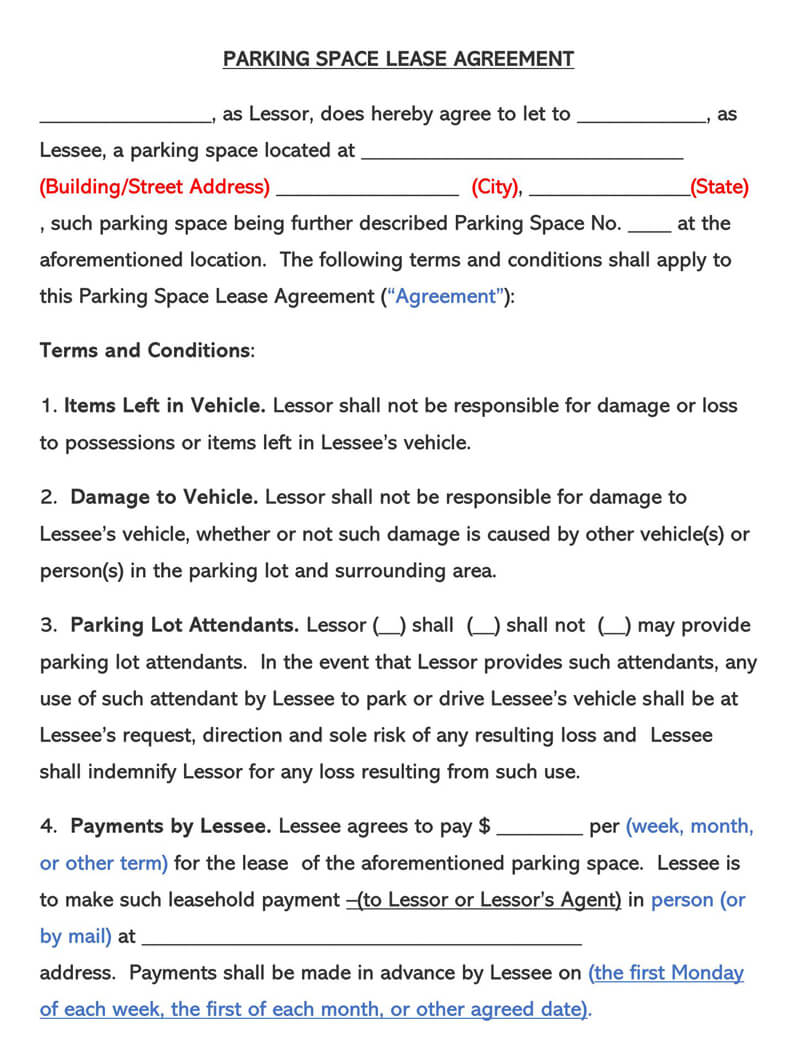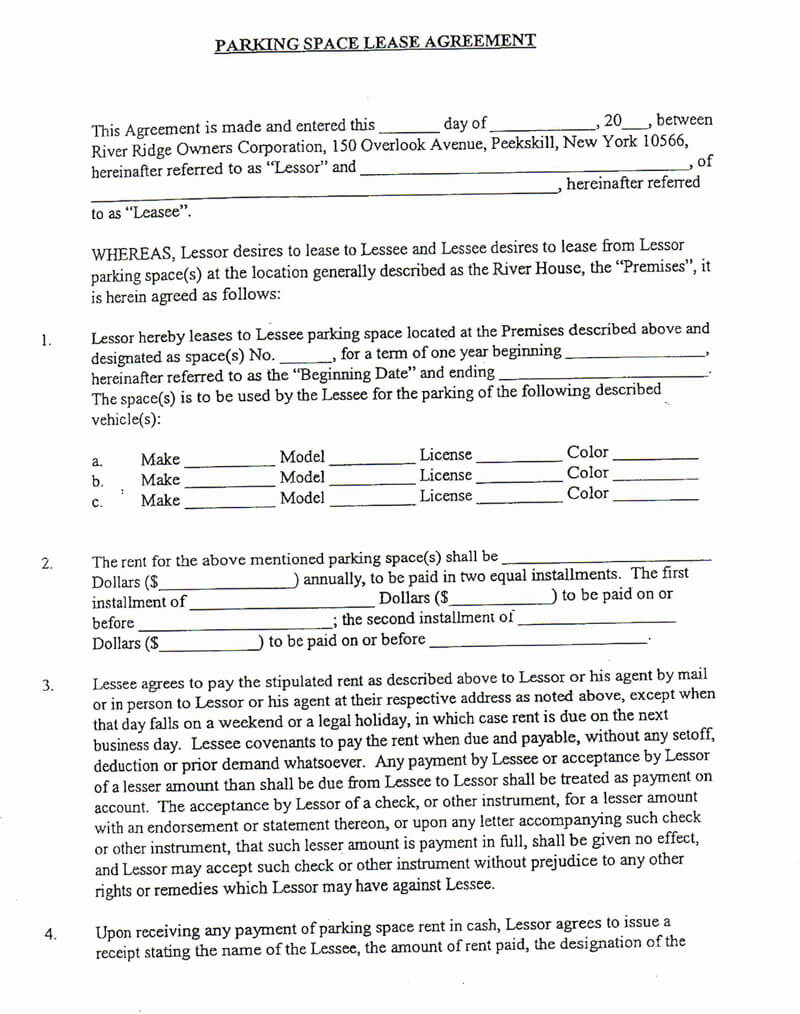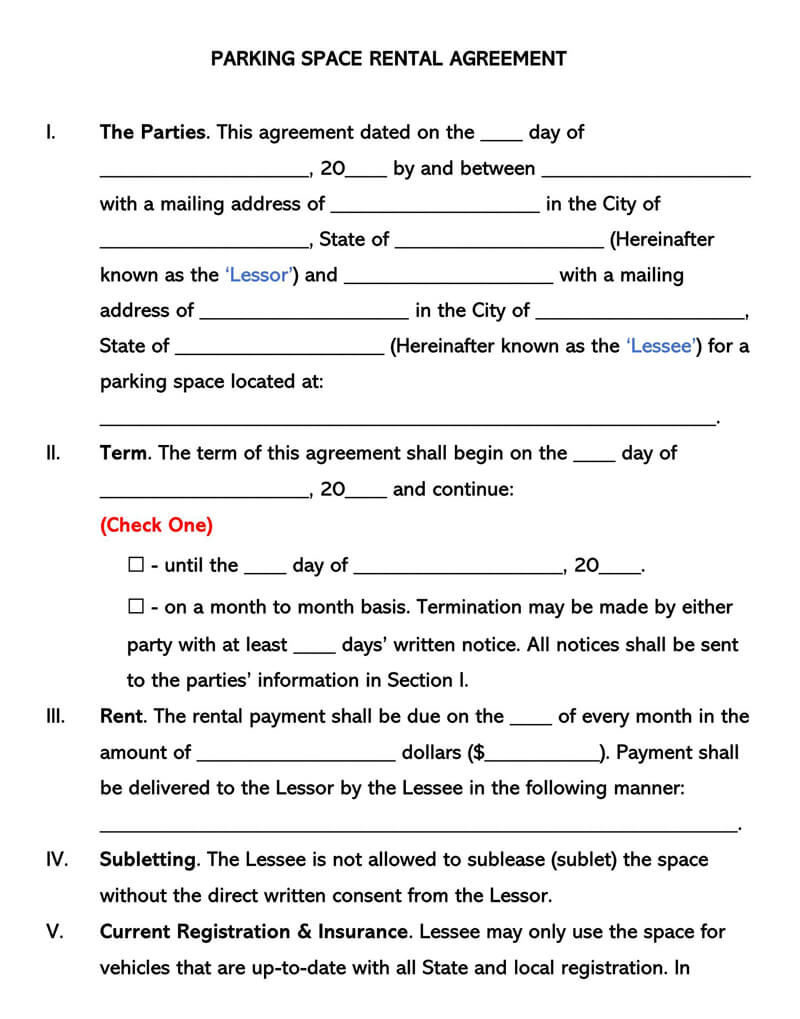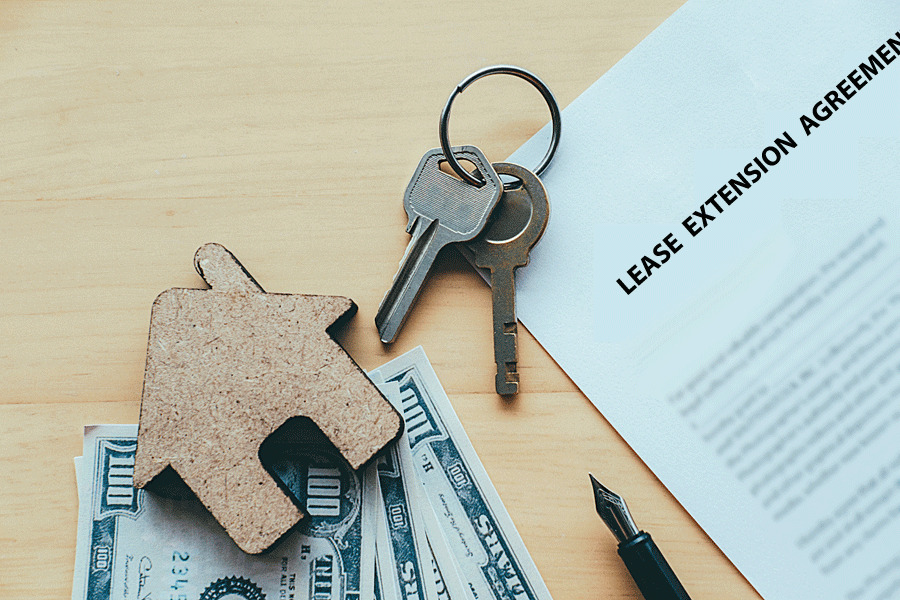It is a lease agreement between a property owner or manager and an individual or entity that wishes to rent a designated parking space for a specified period of time.
This type of agreement is a legal contract that outlines the terms and conditions for leasing a parking space, including the rental payment, duration of the lease, responsibilities of both parties, and any rules or regulations related to the use of the designated space.
It is often used in most commercial areas and big cities where it is hard to find a good, regular parking space. It can also be used in small towns and business complexes where extra spaces could generate extra income. However, there are little to no rules set in most states that govern such agreements, and they can be set for either a fixed term or on a month-to-month basis, depending on what the lessor and the lessee agree on.
note
This contract is valid for one month. Under some unusual circumstances, it may be charged on an hourly or daily basis.
Although both the lessor and the lessee need to agree on using the specified space, it is usually the lessor’s responsibility to set forth rules on liability for the lessee. In this agreement, the lessor can establish standard clauses that indemnify them from any damages caused to the vehicle and hold the lessee responsible for any damages caused to the area during the lease term.
This agreement is similar to any other lease agreement, although much more straightforward. The lessee must agree to all its terms, including the terms, mode, and frequency of the payments.
The lessee must first seek the lessor’s consent before subletting the parking space to another party. The lessee is also tasked with ensuring the area is clean during the term of the lease. They are also required to register their vehicle and have a valid insurance policy when leasing the parking area.
Only the type of vehicle defined in the agreement is allowed to park at the designated location, and no personal storage may be allowed on the premises.
This agreement can also be referred to as:
- Parking rental agreement
- Parking space lease form
- Parking space rental lease agreement
Before drafting such an agreement, it is essential to first understand what information it should contain, when to use it, and what to do when the lessee defaults on the contract. This article provides detailed guidance about such a document and includes free templates as well.
Free Lease Agreement Templates



When to Use Parking Space Lease Agreement?
It can be used if:
- One needs a parking space near their residential unit in a crowded city with limited parking;
- One needs a parking area that is close to their work;
- One has an extra space and would like to lease it to others;
- One is looking to rent someone else’s parking lot;
- One has two or more vehicles and is looking for an extra area to park their vehicles;
- One needs a private location/space when attending an event or business function
General Elements of Parking Lease Agreement
It typically includes the following components:
- Parties: The agreement identifies the parties involved, including the property owner or manager (referred to as the “lessor”) and the individual or entity renting the space (referred to as the “lessee”).
- Description of Parking Space: It specifies the location and description of the parking area being leased, such as the parking lot or garage, the designated parking spot number, and any other relevant details about the space.
- Term: The agreement indicates the duration of the lease, including the start and end dates of the lease period. This may be for a specific period of time, such as a month, a year, or longer, or it may be on a month-to-month or other periodic basis.
- Rent Payment: It outlines the rental payment terms, including the amount of rent, the due date(s), and the method of payment. It may also include any penalties for late payments or other payment-related terms.
- Responsibilities of the Parties: The agreement specifies the responsibilities of both the lessor and the lessee. This may include obligations related to the maintenance and repairs of the designated lot, insurance requirements, and any other responsibilities related to the use of the area.
- Rules and Regulations: This agreement may include any rules or regulations related to the use of the parking area, such as restrictions on vehicle types, parking hours, and the conduct of the lessee and their guests.
- Termination: It may outline the procedures and conditions for terminating the lease, including notice requirements and any penalties or fees associated with an early termination.
- Legal Rights and Remedies: Such an agreement may outline the legal rights and remedies of both parties in case of a breach or dispute, including dispute resolution methods and applicable laws.
- Signature Date: The date on which both parties sign the agreement.
- Lessor signature: The signature and print name of the lessor should be included.
- Lessee signature: The lessee should also include their printed name and sign against it.
It is a legally binding contract that protects the rights and obligations of both parties. It is important for both the lessor and the lessee to carefully review and understand the terms and conditions of the agreement before signing and to seek legal advice if needed.
What Happens When Lessee Defaults?
It’s important to note that laws and regulations regarding such agreements may vary by state and locality, and it’s advisable to seek legal advice specific to your jurisdiction. However, in general, you are correct that these agreements may provide lessors with flexibility in determining how to handle breaches or defaults by lessees, as there may be limited statutory regulations governing such leases.
If a lessee breaches or defaults, such as by failing to pay rent or not adhering to the conditions defined in the agreement, the lessor may have various options, which could include:
- Notice to Remedy: The lessor may provide the lessee with a written notice to remedy the breach, specifying the nature of the breach and a reasonable time frame for the lessee to rectify the issue.
- Imposing Fines or Penalties: It may specify that the lessor has the right to charge the lessee a fine or penalty for certain breaches, such as late payment of rent or failure to maintain the vehicle in the required condition. The amount and conditions for imposing fines or penalties should be clearly defined in this agreement.
- Vehicle Towing or Removal: If the parking area is on private property and the lessee is in breach of the agreement, the lessor may have the right to contact a towing company to have the vehicle removed from the property at the lessee’s expense, as long as it is done in compliance with applicable laws and regulations.
It is important to ensure that any actions taken by the lessor in response to a breach or default by the lessee are consistent with the terms and conditions outlined in the lease agreement and comply with applicable laws and regulations.
It is also crucial to provide proper notice and follow due process to protect the rights of both parties. Consulting with legal professionals can provide guidance and help ensure that the lessor’s actions are in compliance with the law.
Steps for Leasing Out Parking Space
Leasing out a parking space involves several steps. Here is a general outline of the process:
- Determine the Availability: Assess the availability of your area for lease. Consider factors such as location, accessibility, size, and any local regulations or restrictions that may apply.
- Set the Terms: Decide on the terms of the lease, including the rental rate, lease duration, payment schedule, and any additional terms or conditions. It is important to be clear and specific about the terms to avoid any misunderstandings or disputes later on.
- Prepare a Lease Agreement: Draft a written agreement that outlines the terms and conditions of the lease. It should include details such as the names and contact information of the parties involved, a description of the parking space, the rental rate, payment terms, responsibilities for maintenance and repairs, rules and regulations, and any other relevant provisions.
- Advertise the Parking Space: Advertise its availability using appropriate channels, such as online classifieds, social media, or local bulletin boards. Provide clear and accurate information about the location, features, and terms of the parking area to attract potential tenants.
- Screen Potential Tenants: Screen potential tenants by requesting relevant information, such as their name, contact information, vehicle details, and references. You may also consider conducting background checks or credit checks to assess their reliability and ability to pay rent.
- Review and Sign Lease Agreement: Review the agreement with the selected tenant, clarify any questions or concerns, and have both parties sign the document. Make sure to keep a signed copy for your records.
- Collect Rent and Security Deposit: Collect the agreed-upon rent and security deposit from the tenant before allowing them to use the parking lot. Follow any applicable laws or regulations regarding security deposits and provide proper documentation.
- Provide Access and Manage Lease: Once the lease is signed, provide the tenant with access to the parking space and manage the lease according to the agreed-upon terms. Keep records of rent payments, communicate with the tenant regarding any changes or issues, and address any maintenance or repair needs as necessary.
- Terminate or Renew the Lease: When the lease term expires, decide whether to renew or terminate it. If renewing, update the lease agreement with any changes and have both parties sign a new agreement. If terminating, follow the applicable laws and regulations for ending a lease and return any applicable security deposit to the tenant.
Possible Violations
There are no universal rules that define the violations of this agreement. However, the following are some of the common mistakes that the signatories may make when the agreement is in force:
- Sub-letting the space to another party
- Transferring the slot to a third party without the consent of the property owner
- Parking for longer than the agreed-upon number of hours
- Engaging in unlawful activities while parking the vehicle
Frequently Asked Questions
As a property owner, you have the legal right to evict your lessee if they engage in any of the aforementioned prohibited activities. It is crucial to inform the lessee of the unlawful nature of their actions, provide an explanation, and allow them time to rectify the situation. If there is no genuine effort to comply within the specified period, you may request the lessee to vacate the property voluntarily. If necessary, you may involve law enforcement to enforce the eviction.
In some states, one may need a parking permit to rent out a parking space. Therefore, it is advised to research local and state laws pertaining to parking before leasing.
The amount of rent collected from a parking spot usually varies with the location and demand of the parking space. For instance, in small cities, one can collect up to $50 a month, and $150 a month in rural areas.
Yes, you can have a vehicle towed from your property. If the vehicle is parked in a way that prevents you from accessing your property or is blocking your driveway, you can contact the towing company and have them remove the vehicle.
Renting out your driveway is possible if you own the property. However, if you are renting the property or are part of a homeowners’ association, there may be rules or restrictions in place that prohibit renting out your driveway.










